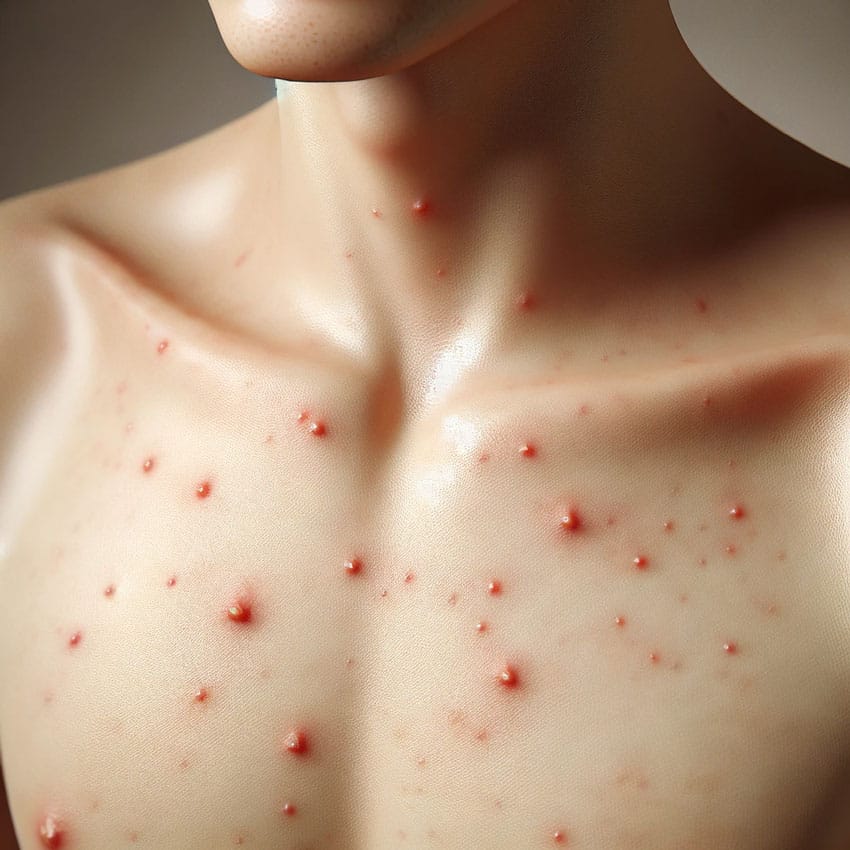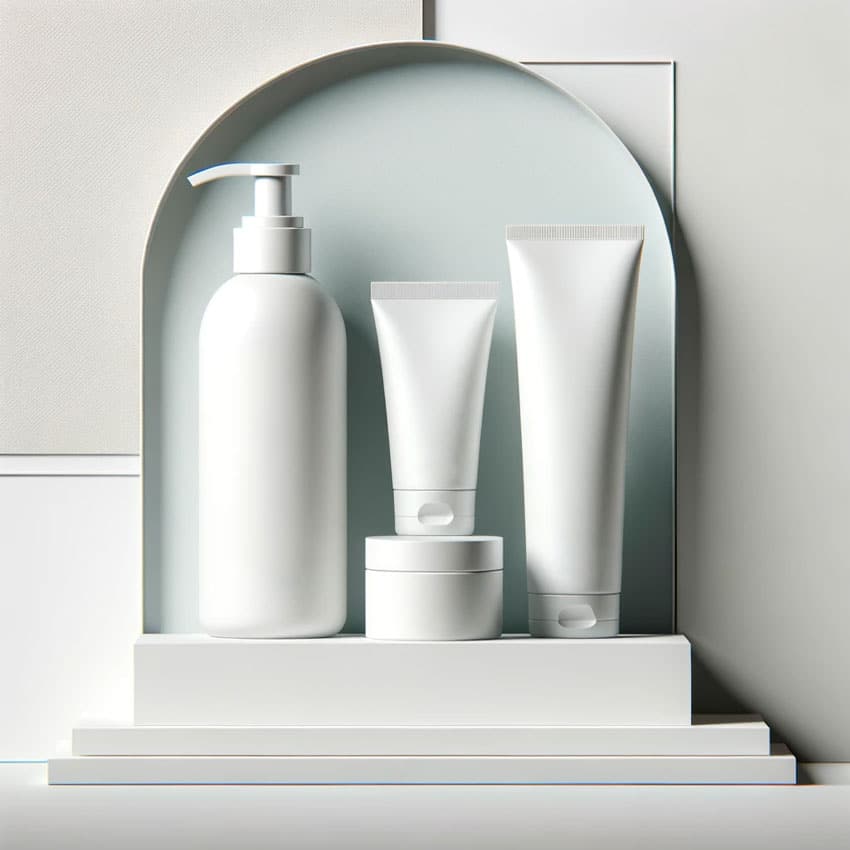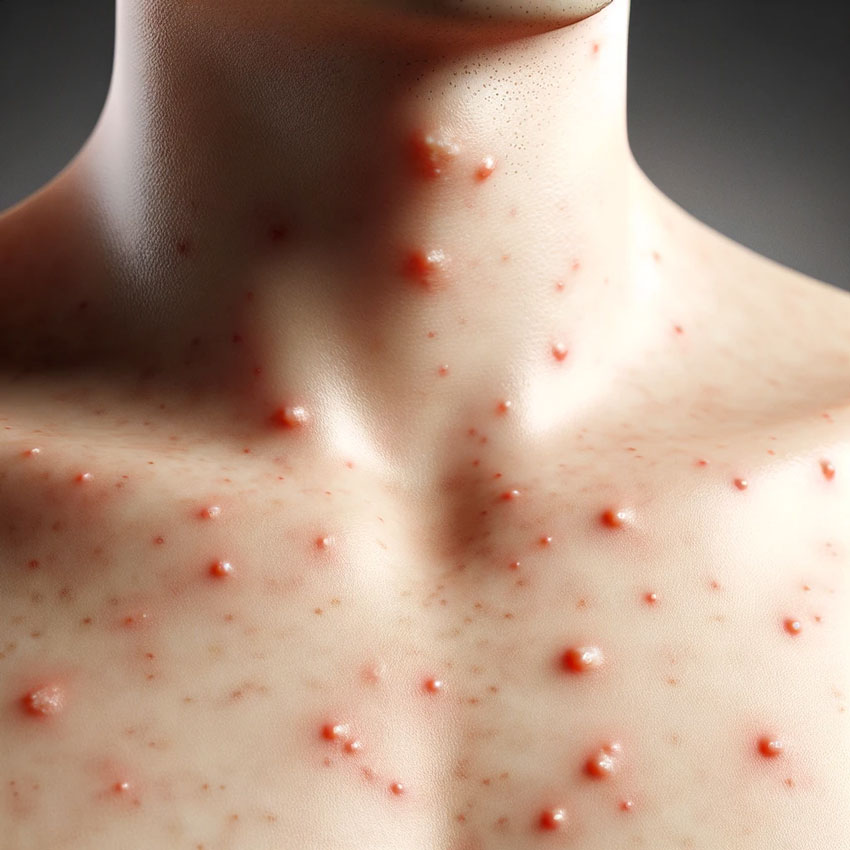Chest acne can be a frustrating and uncomfortable condition for many people. It can affect anyone, regardless of age or gender, and can be caused by a variety of factors.
Chest acne is often caused by clogged pores, which can be exacerbated by sweat, tight clothing, and certain skincare products.
Understanding Chest Acne
Chest acne is a common skin condition that occurs when hair follicles and pores on the chest become clogged with dead skin cells, oil, and bacteria. This can lead to inflammation, redness, and the formation of blackheads, whiteheads, cysts, nodules, and papules.
The chest area contains a high concentration of sebaceous glands that produce sebum, an oily substance that helps lubricate and protect the skin. However, excess sebum production can result in clogged pores and the development of acne.
Several factors can contribute to the development of chest acne, including hormonal fluctuations, genetics, stress, and certain medications.
In addition, wearing tight-fitting clothing or using heavy backpacks can also exacerbate chest acne by trapping sweat and bacteria against the skin.
Inflammatory acne on the chest can be particularly stubborn and difficult to treat. It can cause discomfort and self-consciousness, especially during warmer months when wearing revealing clothing is more common.
Factors Contributing to Chest Acne
Chest acne is a common skin condition that affects both men and women. It can be caused by a variety of factors, including hormonal fluctuations, stress, diet, genetics, and puberty.
Hormones play a significant role in the development of chest acne. Androgens, which are male hormones, are also present in females and can stimulate the sebaceous glands to produce excess oil, leading to clogged pores and acne. Hormonal fluctuations during pregnancy and menstrual cycles can also contribute to chest acne.
Stress is another factor that can contribute to chest acne. When the body is under stress, it produces more androgens, which can increase sebum production and lead to acne. Additionally, stress can weaken the immune system, making it more difficult for the body to fight off acne-causing bacteria.
Diet can also play a role in the development of chest acne. Consuming a diet high in sugar and carbohydrates can cause blood sugar levels to spike, leading to an increase in insulin production. This can cause the sebaceous glands to produce more oil, leading to clogged pores and acne.
Genetics can also contribute to the development of chest acne. If one or both parents have a history of acne, their children are more likely to develop acne as well. Hormonal imbalances and fluctuations can also be hereditary, leading to an increased risk of chest acne.
Puberty is a common time for chest acne to develop, as hormone levels fluctuate and the body goes through significant changes. Teenagers, especially males, are more likely to develop acne due to increased testosterone production.

Preventive Measures Against Chest Acne
Preventing chest acne is easier than treating it. By taking some simple measures, it’s possible to reduce the risk of developing acne on the chest.
Clothing
Wearing tight clothing that doesn’t allow the skin to breathe can contribute to the development of chest acne. It’s recommended to wear loose-fitting clothing made of breathable materials like cotton. Additionally, avoid wearing tight bras or sports bras for extended periods.
Hygiene
Maintaining good hygiene is essential to prevent chest acne. It’s recommended to take a shower after exercising or sweating excessively. Use a gentle, non-comedogenic, and hypoallergenic soap to wash the skin. Avoid using harsh scrubs or loofahs as they can irritate the skin and exacerbate acne.
Exfoliating
Exfoliating the skin can help prevent the buildup of dead skin cells and oil that can clog pores and lead to acne. Use a gentle exfoliating scrub once or twice a week to remove dead skin cells. Avoid over-exfoliating as it can irritate the skin and make acne worse.
Laundry Detergents
Some laundry detergents can irritate the skin and contribute to the development of acne. It’s recommended to use a gentle, fragrance-free laundry detergent. Additionally, avoid using fabric softeners or dryer sheets as they can leave a residue on clothing that can clog pores.
Sunscreen
Sunscreen is essential to protect the skin from sun damage, but some sunscreens can clog pores and contribute to the development of acne. It’s recommended to use a non-comedogenic and oil-free sunscreen. Additionally, avoid wearing heavy makeup or skincare products that can clog pores.
Water
Drinking plenty of water can help keep the skin hydrated and healthy. Additionally, it’s recommended to avoid hot showers or baths as they can strip the skin of its natural oils, leading to dryness and irritation.

Common Treatments for Chest Acne
There are several treatment options available for chest acne. The choice of treatment depends on the severity of the acne and the underlying cause. Here are some of the most common treatments for chest acne:
Topical Treatments
Topical treatments are medications that are applied directly to the skin. These treatments are often the first line of defense against mild to moderate chest acne. Some of the most commonly used topical treatments for chest acne include:
- Benzoyl peroxide: This medication works by killing the bacteria that cause acne. It also helps to unclog pores and reduce inflammation.
- Salicylic acid: This medication helps to unclog pores and reduce inflammation. It is often used in combination with benzoyl peroxide.
- Topical retinoids: These medications are derived from vitamin A and work by unclogging pores and reducing inflammation. They are often used to treat more severe cases of chest acne.
Oral Medications
Oral medications are medications that are taken by mouth. They are often used to treat more severe cases of chest acne. Some of the most commonly used oral medications for chest acne include:
- Antibiotics: These medications are used to kill the bacteria that cause acne. They are often used in combination with topical treatments.
- Oral contraceptives: These medications can help to regulate hormones and reduce acne in women.
- Corticosteroids: These medications can help to reduce inflammation and are often used to treat severe cases of chest acne.

Other Treatment Options
There are also several other treatment options available for chest acne. Some of these include:
- Tea tree oil: This natural remedy has antibacterial properties and can help to reduce inflammation.
- Beta-hydroxy acid: This medication works by exfoliating the skin and unclogging pores.
- Glycolic acid: This medication works by exfoliating the skin and reducing inflammation.
Impact of Chest Acne
Chest acne can have a significant impact on an individual’s self-esteem and confidence. Pimples on the chest can be painful and itchy, causing discomfort and irritation. These pimples can also leave scars, which can be difficult to get rid of and may remain for a long time.
Chest acne can also be caused by excessive sweating, friction, and clogged pores. Poor hygiene can also contribute to the development of chest acne.
It is essential to keep the chest area clean and dry to prevent the accumulation of sweat and oil, which can clog the pores and cause acne.
Using noncomedogenic body lotion and skin care products can help prevent the development of chest acne. These products are formulated to not clog pores and are suitable for acne-prone skin.
Diet can also play a role in chest acne. Consuming skim milk has been linked to the development of acne, including chest acne. It is recommended to avoid milk and dairy products if you have acne-prone skin.
Dryness can also contribute to chest acne. It is essential to keep the skin moisturized to prevent dryness, which can lead to the overproduction of oil by the oil glands, leading to acne.
Scrubbing and excessive washing of the chest area can also irritate the skin and worsen chest acne. Instead, gentle cleansing with mild soap and warm water is recommended.
Natural remedies such as honey, mud masks, and charcoal masks can also be effective in treating chest acne. These remedies have anti-inflammatory and antibacterial properties that can help reduce inflammation and prevent the development of new pimples.
When to Consult a Dermatologist

While most cases of chest acne can be treated with over-the-counter products or simple lifestyle changes, there are some instances where it may be necessary to consult a dermatologist.
Dermatologists are medical professionals who specialize in the treatment of skin conditions and can provide expert advice and treatment options for more severe cases of chest acne.
If the chest acne is causing pain, or discomfort, or is accompanied by other symptoms such as fever or swelling, it is recommended to consult a dermatologist.
Additionally, if the chest acne does not respond to over-the-counter treatments or persists for an extended period, a dermatologist can provide a more personalized treatment plan.
Dermatologists may recommend prescription-strength topical or oral medications to treat chest acne, such as antibiotics or retinoids. They may also recommend procedures such as chemical peels or laser therapy to reduce the appearance of scars caused by chest acne.
It is important to note that while body scrubs and exfoliants may be effective in treating mild cases of chest acne, they should be used with caution and under the guidance of a dermatologist.
Frequently Asked Questions
What are some effective home remedies for female chest acne?
Several home remedies can help treat chest acne in females. These include using tea tree oil, apple cider vinegar, aloe vera, and baking soda. Tea tree oil has antibacterial properties that can help kill acne-causing bacteria, while apple cider vinegar can help balance the skin’s pH levels. Aloe vera has anti-inflammatory properties that can help reduce redness and swelling, and baking soda can help exfoliate the skin and unclog pores.
How can I get rid of chest acne overnight?
It’s important to note that getting rid of chest acne overnight is not always possible. However, there are some things you can do to help reduce the appearance of acne quickly.
One option is to use a spot treatment containing benzoyl peroxide or salicylic acid. These ingredients can help dry out pimples and reduce inflammation.
Another option is to apply a warm compress to the affected area for 5-10 minutes to help open up pores and reduce swelling.
What are some methods to treat chest acne in females?
There are several methods to treat chest acne in females.
One option is to use over-the-counter acne treatments containing benzoyl peroxide or salicylic acid. These products can help kill acne-causing bacteria and unclog pores.
Another option is to use prescription-strength acne medications, such as topical retinoids or oral antibiotics. It’s also important to practice good skincare habits, such as washing the chest area twice a day with a gentle cleanser and avoiding tight-fitting clothing.
What are some methods to treat chest acne in males?
The methods to treat chest acne in males are similar to those for females. Over-the-counter acne treatments, prescription-strength medications, and good skincare habits can all be effective.
In addition, males should avoid using products that contain harsh chemicals or fragrances, as these can irritate the skin and make acne worse.
How can I get rid of chest acne scars?
Getting rid of chest acne scars can be challenging, but there are several options available.
One option is to use topical treatments containing retinoids or alpha hydroxy acids, which can help reduce the appearance of scars over time.
Another option is to undergo a cosmetic procedure, such as laser resurfacing or chemical peels. These treatments can help improve the texture and tone of the skin, reducing the appearance of scars.
What are the common causes of chest acne in females?
There are several common causes of chest acne in females. Hormonal fluctuations, such as those that occur during puberty, menstruation, or pregnancy, can contribute to the development of acne.
Other factors that can cause chest acne include genetics, stress, poor skincare habits, and certain medications. It’s important to talk to a dermatologist to determine the underlying cause of chest acne and develop an effective treatment plan.

